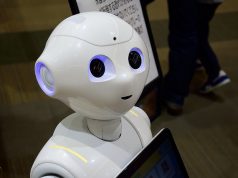Welcome to the first of a series of interviews introducing you to members of the DER group. In this first interview, visiting Erasmus students Pedro Bolea and Motahar Saleheen interview Professor Neil Selwyn.
Neil Selwyn joined the Digital Education Research Group at Monash University in 2012, after his previous experience at the Institute of Education – University College London, Cardiff University and the University of Bristol. One of the most renowned voices in the field of educational technologies, his extensive research focuses on the place of digital media in everyday life and the sociology of technology use in educational settings, covering various issues including digital exclusion, social media, education technology policymaking and student experience of technology-based learning.
policymaking and student experience of technology-based learning.
At the moment, he is finishing a book on “the hype around AI and robots” and participating in “all sorts of research” from digital labor to digital data, as well as hosting the Meet the Education Researcher podcast.
Q: What is the background that drove your interest towards education and technology?
NS: My initial background, where I did my first degree, was in politics, sociology, and education. I was quite interested in political economy, I was quite interested in policy, I was quite interested in inequality, and all of those issues. I figured that working in education was the easiest route in terms of doing research and getting funding and scholarships. Within education, when I did my PhD in 1995, technology and the internet and digital education was just beginning, so I could see that as an area that would be fruitful and might be long lasting.
My interest isn’t really in technology, and I’m not a teacher, and I’m not particularly interested in education, but I’m interested in sociology and politics. From there, I’ve just done research looking at technology and education through that lens of politics, sociology, and this kind of critical perspective that’s interested in everything apart from teaching and learning. I’m not really interested in teaching and learning. I’m interested in everything else that takes place around technology and education settings. I’m not wedded to a particular type of technology or a particular type of education, but I’m just interested in why things are happening in the way that they are and how could they be otherwise, how could they be better.
Q: So, speaking about why things are happening the way that they are, nowadays we are observing the emergence of a discourse that claims that new technologies should be massively adopted in the schools to disrupt their outdated model. Why is this narrative becoming hegemonic?
NS: This narrative has existed since the 80s, possibly even earlier than that, so a lot of my work builds upon work of previous people that have argued exactly the same thing during the 80s and 90s. The idea of technologies being used as a solution to fix the education system was taking place in the 80s, that was one of the arguments for having computers in the classrooms. I think it has taken off in the past ten years because the technology has got a lot better.
We do have technologies now that are capable of making a difference in classrooms in ways that they weren’t even ten years ago. They’re affordable. The rise of personal devices that students are bringing into school suddenly gets over the problem of resourcing and the whole idea of having one computer per child. The technology’s caught up with the hype. It has become increasingly a way that politicians can address big problems in society. We now live in a more digital society, so, all of a sudden, education is an easy way to try to fix problems, whether it be fake news or whether it be online bullying, whatever it is. I think the last ten years has seen an increase in the hype, but the hype has always been there. And fundamentally though, there are a lot of issues around technology and education that just come down to the arguments about what education is. Why do we have schools? What are they for? Whose purposes do they serve? What should they be like in the future? And those are long-running questions.
“There are lots of reasons that people are pushing this idea of technology can revolutionize or disrupt schools. Very little of it comes back down to making education better, or more meaningful, or more useful for students.”
The idea of technology as an agent of change has to do with the politics of education. The question is; why do people see schools as not working properly? Schools are clearly fulfilling their role in terms of taking people in, keeping them detained for fifteen years, and then pushing them out with a qualification that sorts them out for the work force. And that’s always been the function of schools. But, corporations are increasingly disgruntled that workers don’t have the right skills that they want, or the dispositions or the understandings that they want. A lot of people are quite anti-government, so they want small government. The idea of public education is quite offensive to them. Other people are quite against the idea of monopolies. Why can’t the private sector get involved and make money? So, there are lots of reasons that people are pushing this idea of technology can revolutionize or disrupt schools. Very little of it comes back down to making education better, or more meaningful, or more useful for students.
Plus, we have also now got this hugely influential IT industry; big tech, Silicon Valley, whatever you want to call it. The Amazon and the Googles and the Facebooks of the world are suddenly really powerful, perhaps more powerful than governments, so they are beginning to push the agenda whereas before, it was mainly governments. Now you’ve got these big transnational corporations, and, if Jeff Bezos from Amazon says he wants to start a new network of preschools, people listen. It’s still a hype though. It is still fundamentally not changing what schools are like. There are still thousands of schools that are exactly the same as they were ten years ago, despite all the hype. But it’s the three or four Alt schools or P-TECH schools or Quest to Learn schools that people focus on.
Q: So, as researchers, which are the kind of questions that we should focus on when analyzing the adoption of educational technologies?
NS: I’m always interested in asking, why are things happening? So why is this seen as a problem? Whose problem is it? In whose interest is it working? If someone uses a technology for a particular thing, what are the motivations, the logics, the interests and the agendas that are pushing that? Because clearly, what you might see as a problem is very different to what I might see as a problem. I’m interested in the politics, the interests, the values and the ideologies behind anything, nothing is neutral. Technology doesn’t just come in and help people learn better. So, I mean, why? Why are we doing this in the first place? In whose interest is it operating? And then also questions of, what is not happening? What is being silenced or pushed to one side? Who is not benefiting?
One of the interesting things about tech and ed is that people’s focus is always on what’s going to happen or what should happen or might happen, what’s the potential of the technology. And those questions to me are not interesting at all. I’m much more interested in what is going on at the moment, why, who’s losing and who’s winning.
If technologies could be used in education with no consequences or costs, then I wouldn’t have a problem with it. But anytime you do something, you’re not doing something else. If you’re investing money in laptops, you’re not investing money in something else, and that’s why I have problems with it. If it’s distracting us from other things, then it’s an issue. And often, technology is used in ways which does disadvantage people who are already disadvantaged. The kids who don’t get to use the technology are the kids who don’t get to do a lot of things. So, it increases inequality.
Q: However, the image that we often get is that technologies are going to make everyone learn better.
NS: People always talk about equity and inequality in technology democratizing things. It’s just a nice label to hang on it. I’m not sure many people fully believe that it does make the world a more just place. The idea that technologies give everyone, in theory, better opportunities to do things never really tends to translate into outcomes. Because, clearly, what you do with the technology is also dependent upon a lot of other variables that have got nothing to do with technology such as your class agenda, your educational background, your socioeconomic status, etc. Just giving someone a laptop isn’t really addressing the underlying reasons that they’re disadvantaged, or they’re marginalized. But what can you do? It’s much easier to give people a laptop than to address poverty, poor housing or whatever it is.
We tend to find that technologies do help people do things, but they often help those that are already advantaged. There is this idea of the Matthew effect that technology tends to advantage those who are already advantaged. So, it increases inequalities. Everybody might be getting better, but those who are doing better already get much, much better. I’m not saying that technologies are necessarily detrimental and make things worse, but they’re not fair or just, and people don’t tend to care about that. It’s much easier to notice equality of opportunity. We have given a laptop to everybody is an easy thing to see. The fact that then those laptops are not leading to the same advantages, people don’t really care about that or have the time to really deal with that, so it’s not just an educational issue. It’s the same with technology in every area of life.
Q: The hype around ed-tech is not only coming with a new vocabulary(21stcentury skills, disruption of education, etc..) but also with new discourses around technology-based learning, such as connected learning or personalized learning. What do these “theories” have of new?
NS: Well, these are not theories, so connectivism isn’t a theory or even a concept. It’s just a description. So, one of the interesting things in this area is that these are not real theories. People still rely on theories from the 1930’s or 40’s. Vygotsky is still talked about in glowing terms, or Lave and Wenger’s communities of practice, concepts which were developed in completely pre-digital ages. Communities of practices looking at how people learn to cut up sails or chop up meat as butchers in the 1950s doesn’t relate to 2010s digital learning. It’s interesting that stuff like connectivism, connected learning, personalized learning, they’re just descriptions. But they’re taken upon as theory. So, there’s definitely a need for theory building that relates to digital context and digital ways of learning and digital knowledge.
In some ways, people just need labels in ways to sell things so that personalized learning hype, I think, is dying down now. But it was big in a couple of years ago because Mark Zuckerberg, the Zuckerberg Chan Foundation, decided it was a big thing, announced that personalized learning is important, and everyone then scrambled around to try to find what personalized learning is. I mean, it’s just individualized mass customized learning through technology. It doesn’t relate at all to the ideas of personalized learning from the 1960s and 1970s. I think these are just labels. I don’t really think they’re theories at all. So, we need theory. We should be building theory for the digital age and ignoring these kinds of quasi frameworks. The idea that information is connected, and everyone’s part of it, that’s interesting. It’s not a theory. It doesn’t really add to our understanding.
Q: As part of these discourses, we also often hear that the role of teachers is going to significantly change, or even that they are going to disappear. So, which should be the role of teachers in this digital age?
NS: It’s always fashionable to bash teachers or to say that teachers are to blame for technology or teachers are obsolete. Teaching as a profession is challenged by technology, but it can also be enhanced by technology. Personally, I don’t think you’re going to get rid of teachers soon. If you are going to get rid of teachers, it will be in universities as opposed to primary schools, and they are very different jobs, they are completely different jobs. One of the things that new technologies do is highlight what it is that the teacher adds to the learning process. If you think about teaching as an effective role in terms of emotions, in terms of relationships, and you think about teaching as a more of a human process, then I think there are plenty of things that teachers are needed for, and plenty of things that need to be developed in teachers.
“Teachers need to be much clearer about what it is that they offer, what it is that they can do, because no one else is going to speak up for them.”
I wrote a short piece recently about why do we need teachers in an age of AI, and it’s precisely the things about being able to embody; the use of the body, embodied pedagogy and the idea about connecting with another human. How a human brain works and how you learn with a human brain is quite difficult to model. Only a human that has learned something can help another human learn something in the same way because you’ve got that shared experience. There’s a cognitive thing going on. And a social aspect as well. If we think that education is a conversational, socially interactive process then you need other people to converse with and to be socially interacted with. So, there’s definitely need for teachers. Possibly they won’t be needed to do the more procedural, administrative and instrumental work. There is no problem with automating things as the teacher taking a register of students at the beginning of the class, or possibly even grading essays or giving feedback. But where those things have a social element to them, then it’s very dangerous to automate it. When I take the class register of students, it’s actually an excuse for me to talk with my students, to get to know them, to check that they’re okay, to see how they’re feeling, then that’s a real important thing for human teachers to do rather than a machine. We definitely want to automate the stuff that’s really dumb and unintelligent and can just be automated, but we want to make sure that we don’t lose sight of the human, the cognitive, the social, and all those things that I think only a human teacher can do.
Q: But do you think there is a risk that that could happen?
NS: Of course, it will because it’s cheaper. Everyone wants to get rid of teachers because it’s much easier for policy makers and for school leaders and for companies to control things through technology. There’s a big danger that we will get rid of teachers.
Q; So, how might things be otherwise?
NS: Teachers need to recognize the problem or recognize the challenge and the issue, to actually be much more vocal about what is that they do. It’s mainly about having a conversation about technology and education because this is an area that people don’t really talk about. They don’t really care about. They just assume that it’s great, and it’s fine. It’s not controversial. So, if we can make it more of a problem, to highlight the controversial, to highlight where there are discussions we need to have, and then to actually sit down and say; right, rather than the technology being a a done deal, we have choices, we can choose the technologies that we have, we can choose the types of education that we have. In the technological age, what do we want?
Teachers need to be much clearer about what it is that they offer, what it is that they can do because no one else is going to speak up for them. You can get teaching unions involved, you can get teacher groups involved, you can get parents and students and local communities to have an input into this conversation. Because at the moment, as we were talking about in the beginning, the conversation is dominated by people that want technology to be used in schools, by tech companies or technology enthusiasts. They have a vested interest in technologies being used. We need to get all the other people, the silent majority that don’t really care, to actually have their say as well, make it more of a democratic process.
Q: To conclude, which are the next steps that you are interested in to take as a researcher?
NS: Personally, I’m just now writing something about sustainability and the environment because none of this technology’s sustainable. So, it’s stupid talking about why we still need one device per person. In thirty years’ time it will be seen as a really excessive, extravagant, dangerous thing to be arguing. So, what’s that tech going to look like once we’ve run out of rare metals, once the sea levels have risen, and we can’t live on half the planet because it’s burning up? What do we do then? In my opinion, that is a bigger problem. Nobody really wants to talk about that, but I think that’s interesting.
“What’s that tech going to look like once we’ve run out of rare metals, once the sea levels have risen, and we can’t live on half the planet because it’s burning up?”
And I’m also interested in this idea of algorithms and artificial intelligence. That’s clearly going to be of interest in the next ten years, so how do people work with algorithms and automated decision-making in education? How do people encounter them? How do people engage with them? How do people understand them? What’s it going be like to learn in algorithmic conditions? Because that is quite tricky. I’m not interested in devices anymore. I’m not really interested in social media. I’m not really interested in learning management systems, but this idea of algorithms, data…. I realize that biotechnology is quite important as well, neuroscience stuff, pharmaceutical technologies, smart drugs, those kinds of things. When you think about where things are going in thirty years’ time, those are the things that are really important. We need theory. We need to think about these post-digital technologies and start thinking, thinking otherwise.







